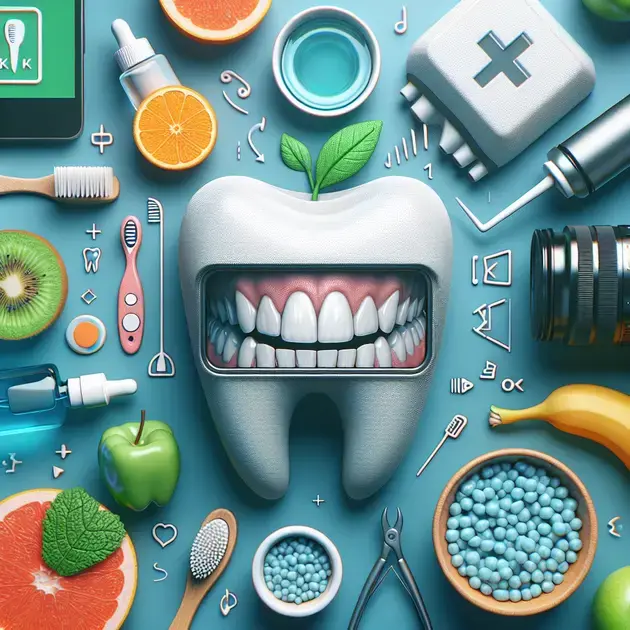Oral health plays a crucial role in maintaining strong teeth & gums. From preventing cavities to ensuring fresh breath, taking care of your oral hygiene is essential for overall well-being. With the right habits and guidance, you can achieve a healthy smile that lasts a lifetime.
Recent studies have shown that poor oral health can be linked to various systemic diseases, emphasizing the importance of a comprehensive dental care routine. This guide serves as a valuable resource to help you understand the best practices for oral hygiene and maintaining strong teeth & gums for optimal health.

The Importance of Oral Health
Oral health plays a crucial role in our overall well-being. Maintaining good oral hygiene can help prevent various dental issues such as cavities, gum disease, and bad breath. Additionally, poor oral health has been linked to more serious health conditions like heart disease and diabetes. To prioritize your oral health, follow these essential tips:
1. Brush and Floss Regularly
One of the key steps to maintaining good oral health is to brush your teeth at least twice a day and floss once a day. Use a fluoride toothpaste and a soft-bristled toothbrush to gently clean your teeth and gums.
For more detailed instructions on proper brushing and flossing techniques, you can visit the American Dental Association’s website at ada.org.
2. Visit Your Dentist Regularly
Schedule regular check-ups with your dentist to ensure that your teeth and gums are healthy. Dentists can detect early signs of dental issues and provide preventive care to maintain your oral health.
To find a reputable dentist in your area, you can use the American Dental Association’s Find a Dentist tool at findadentist.ada.org.
3. Maintain a Balanced Diet
Eating a balanced diet rich in fruits, vegetables, lean proteins, and dairy products can contribute to good oral health. Avoid sugary and acidic foods that can erode tooth enamel and lead to cavities.
For tips on nutrition for oral health, you can consult the Academy of Nutrition and Dietetics website at eatright.org.
4. Avoid Tobacco and Limit Alcohol Consumption
Smoking and using tobacco products can significantly impact your oral health, increasing the risk of gum disease, tooth loss, and oral cancer. Limiting alcohol consumption can also help prevent oral health issues.
You can find resources and support for quitting smoking on the Centers for Disease Control and Prevention website at cdc.gov.
5. Stay Hydrated
Drinking an adequate amount of water is essential for maintaining good oral health. Water helps rinse away bacteria and food particles that can lead to plaque buildup and tooth decay.
For more information on the benefits of staying hydrated, you can visit the Mayo Clinic’s website at mayoclinic.org.
Tips for Strong Teeth & Gums
Strong teeth and gums are essential for a healthy smile and overall well-being. By following these tips, you can help keep your teeth and gums strong and free from dental issues:
1. Practice Good Oral Hygiene
Regularly brushing and flossing your teeth is crucial for maintaining strong teeth and healthy gums. Use fluoride toothpaste and a proper brushing technique to effectively clean your teeth and prevent plaque buildup.
For detailed instructions on how to brush and floss for strong teeth and gums, you can visit the Colgate Oral Care Center website at colgate.com.
2. Use Fluoride Products
Fluoride is a mineral that can strengthen tooth enamel and help prevent tooth decay. Use fluoride toothpaste and mouthwash as part of your oral care routine to protect your teeth against cavities.
You can find a variety of fluoride products for strong teeth and gums at your local pharmacy or online at websites like walgreens.com.
3. Eat a Nutritious Diet
A balanced diet plays a crucial role in maintaining strong teeth and gums. Include foods rich in calcium, vitamin C, and other essential nutrients to support your oral health.
For tips on nutrition for strong teeth and gums, you can consult the American Dental Association’s MouthHealthy website at mouthhealthy.org.
4. Avoid Teeth-Staining Habits
Habits like smoking, excessive coffee consumption, and consuming acidic foods can stain and weaken your teeth. Avoid these habits to maintain strong and healthy teeth.
For resources on quitting smoking and improving oral health habits, you can visit the National Institute on Drug Abuse website at drugabuse.gov.
5. Wear a Mouthguard During Physical Activity
If you participate in sports or activities that pose a risk of dental injury, wearing a mouthguard can help protect your teeth and gums from trauma. Invest in a custom-fit mouthguard for maximum protection.
You can purchase a custom mouthguard for strong teeth and gums at your local dentist’s office or online at websites like sportsguard.com.
Maintaining a Healthy Smile
A healthy smile not only boosts your confidence but also reflects good oral health. To maintain a healthy smile, consider the following tips:
1. Smile-Friendly Dental Care Products
Choose dental care products that are gentle on your teeth and gums, such as soft-bristled toothbrushes and alcohol-free mouthwash. Look for products with the American Dental Association’s Seal of Acceptance for quality assurance.
For a range of smile-friendly dental care products, you can visit the Crest website at crest.com.
2. Practice Good Habits
In addition to brushing and flossing, practice good oral habits like tongue cleaning and using a water flosser for thorough plaque removal. These habits can contribute to a healthier smile.
For more information on good oral habits for a healthy smile, you can explore the Waterpik website at waterpik.com.
3. Professional Teeth Whiteningopineoutpost.com.
For professional teeth whitening services and products, you can visit your dentist or explore reputable online retailers like opineoutpost].

Proper Brushing Techniques
Proper brushing techniques are essential for maintaining good oral health and preventing dental issues. To ensure effective brushing, follow these simple steps:
Step 1: Choose the Right Toothbrush
Start by selecting a soft-bristled toothbrush that fits comfortably in your mouth and can reach all areas easily.
Step 2: Use the Correct Technique
Hold your toothbrush at a 45-degree angle to the gums and use gentle, circular motions to clean the front, back, and chewing surfaces of your teeth.
Step 3: Don’t Forget Your Tongue
Brushing your tongue helps eliminate bacteria and freshens your breath. Use a tongue scraper or your toothbrush to gently clean the surface of your tongue.
Step 4: Brush for at Least Two Minutes
For optimal oral hygiene, brush your teeth for a minimum of two minutes. Set a timer or listen to a short song to ensure you’re brushing for the right amount of time.
Step 5: Rinse Thoroughly
After brushing, rinse your mouth with water or mouthwash to remove any remaining debris and bacteria. Spit out the rinse and avoid swallowing it.
Flossing for Oral Health
Flossing is a crucial step in maintaining oral health, as it helps remove plaque and food particles from between the teeth where your toothbrush can’t reach. Follow these steps for effective flossing:
Step 1: Choose the Right Type of Floss
Select a floss that works best for you, whether it’s waxed, unwaxed, flavored, or unflavored. The key is to use it regularly.
Step 2: Use the Correct Technique
Take a piece of floss around 18 inches long and wrap it around your middle fingers, leaving a few inches in between to work with. Gently slide the floss between your teeth and curve it around each tooth in a C shape.
Step 3: Be Gentle but Thorough
Avoid snapping the floss into your gums, as this can cause irritation. Instead, glide the floss up and down each side of the tooth to clean both surfaces.
Step 4: Floss Every Day
Make flossing a daily habit to maintain healthy gums and prevent gum disease. It only takes a few minutes and can make a significant difference in your oral health.
Step 5: Rinse Your Mouth
After flossing, rinse your mouth with water or mouthwash to remove any loosened debris and bacteria. This step complements your oral hygiene routine.
Nutrition for a Strong Smile
Good nutrition plays a vital role in promoting a strong smile and overall oral health. Incorporate the following tips into your diet to support your teeth and gums:
Step 1: Eat Calcium-Rich Foods
Calcium is essential for strong teeth, so include dairy products, leafy greens, and fortified foods in your meals to promote healthy enamel and bone structure.
Step 2: Consume Vitamin C
Vitamin C is crucial for gum health and collagen production. Enjoy citrus fruits, bell peppers, and strawberries to boost your immune system and maintain healthy gums.
Step 3: Limit Sugar Intake
Excessive sugar consumption can lead to cavities and tooth decay. Opt for natural sweeteners like honey or fruits and reduce your intake of sugary snacks and beverages.
Step 4: Stay Hydrated
Drinking plenty of water helps wash away food particles and bacteria, preventing dry mouth and promoting saliva production for natural oral cleansing.
Step 5: Include Crunchy Vegetables
Fibrous vegetables like carrots, celery, and cucumbers help clean teeth while you chew, stimulating saliva flow and reducing plaque buildup.
Conclusion
In conclusion, proper brushing techniques, effective flossing, and good nutrition all play crucial roles in maintaining optimal oral health. By following the recommended steps for brushing – choosing the right toothbrush, using the correct technique, not forgetting the tongue, brushing for at least two minutes, and rinsing thoroughly – you can prevent dental issues and promote healthy teeth and gums.
Furthermore, incorporating regular flossing into your daily routine helps remove plaque and food particles from areas that a toothbrush cannot reach, leading to healthier gums and reducing the risk of gum disease. Remember to choose the right type of floss, use the correct technique, be gentle but thorough, floss daily, and rinse your mouth after flossing to complete your oral hygiene routine.
Lastly, nutrition plays a vital role in supporting oral health. Consuming calcium-rich foods, vitamin C, limiting sugar intake, staying hydrated, and including crunchy vegetables in your diet can contribute to stronger teeth, healthier gums, and overall oral well-being. By following these steps and maintaining a consistent oral care regimen, you can achieve a strong smile and prevent oral health issues in the long run.